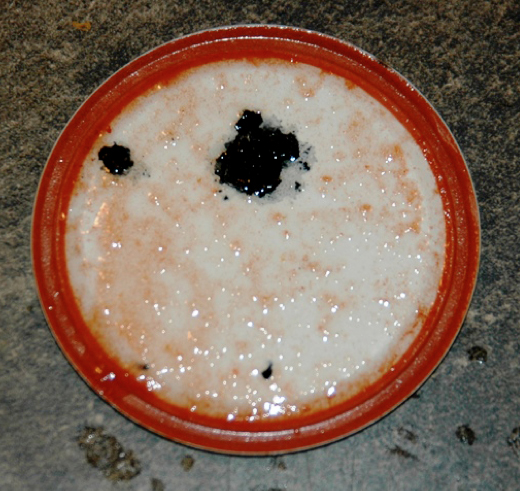
Okay, you have worked really hard to preserve food, forage food and stretch your food dollar. You made sure to have plenty of room to store your jars and frozen goods. The next question is how long does everything keep before food spoilage happens?
Food Spoilage in Cans

Food that is home canned stored in a dark, dry environment with temperatures between 50 and 70 degrees Fahrenheit should be used within a year. They should be stored with the bands off so you know that they are properly sealed. The jars should be wiped clean so there is no food residue.
I like to write the date with permanent marker on the lid. If lids are tightly vacuum sealed on cooled jars, remove screw bands, wash the lid and jar to remove food residue; then rinse and dry jars. Label and date the jars and store them in a clean, cool, dark, dry place. For best quality, store between 50 and 70 °F.
Can no more food than you will use within a year. This sometimes surprises people because the canned food they purchase from the store is usually dated further out than a year.
One major difference between home canning and commercial canning is that the temperatures commercial processors use are much higher than can be achieved in a home kitchen. That is why pumpkin can be canned commercially as puree but only in cut up cubes by the home canner. It is safe to use cubes because the heat can circulate through the liquid around the cubes but cannot get hot enough to consistently and evenly penetrate something as thick as pumpkin puree. The same preservation issues involved with pumpkins are true for winter squash.
I always halve my winter squash, cook them cut side down in the oven on a silicone-lined four-sided cookie sheet.* I add water at a depth of half the side height and bake at 425 degrees Fahrenheit for 40-60 minutes. I then let the squash cool, scoop it out into a large mixing bowl and then whip it with my hand mixer. I package it in serving size freezer bags and freeze them flat after they have been labeled with the type of squash and the date.
Food Spoilage in the Freezer
According to the USDA (United States Department of Agriculture), food kept in a freezer will not spoil but the quality of the food in terms of taste and texture will diminish over time. In other words, it likely will not kill you two years from now, but you may not want to eat it either. The following are the USDA quality for use recommendations:
- Bacon and Sausage 1-2 months
- Casseroles 2-3 months
- Frozen Dinners and Entrees 3-4 months
- Gravy, meat or poultry 2-3 months
- Ham, Hotdogs and Lunchmeats 1-2 months
- Meat, uncooked roasts 4-12 months
- Meat, uncooked steaks or chops 4-12 months
- Meat, uncooked ground 3-4 months
- Poultry, uncooked whole 12 months
- Poultry, uncooked parts 9 months
- Poultry, cooked 4 months
- Soups and Stews 2-3 months
- Wild game, uncooked 8-12 months
Learn More About Food Spoilage & Food Preservation
Learn the proper preservation techniques that avoid food spoilage in Tracy Schmidt's excellent Living Ready University Online Course, Food Preservation & Garden Planning. Schmidt offers a bird's eye view of staying self-sufficient throughout the year.
Click here to download this essential food preservation course from Living Ready University.

![Best Concealed Carry Guns In 2025 [Field Tested] Wilson Combat EDC X9S 1](https://gundigest.com/wp-content/uploads/Wilson-Combat-EDC-X9S-1-324x160.jpg)


![Best 9mm Carbine: Affordable PCCs [Tested] Ruger Carbine Shooting](https://gundigest.com/wp-content/uploads/Ruger-Carbine-Shooting-100x70.jpg)
![Best AR-15: Top Options Available Today [Field Tested] Harrington and Richardson PSA XM177E2 feature](https://gundigest.com/wp-content/uploads/Harrington-and-Richardson-PSA-XM177E2-feature-100x70.jpg)
